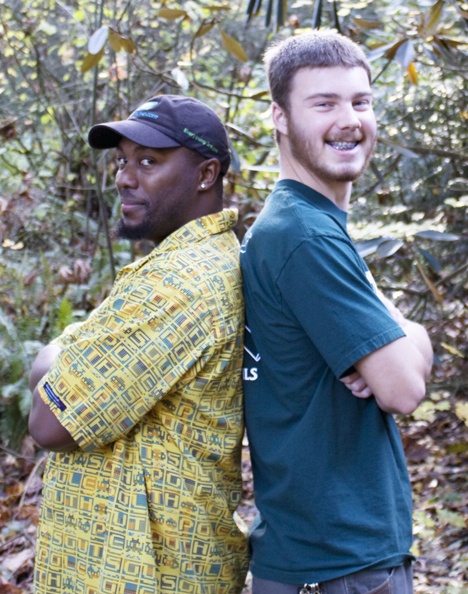Jared Schiff and Terrence Thompson are big-brained guys crazy about math and physics and headed for careers as mechanical engineers.
Bachelor degrees are off in the future. Schiff, 21, bound for Montana State University, hopes one day to work for a small company. Thompson, 29, a U.S. Navy veteran, expects to make his mark in emergent green technologies after he graduates from the University of Washington.
For now, the men are students at Green River Community College, where crucial scholarships are helping them get where they want to go. Schiff’s fulcrum is the $3,000 Paul G. Dong Memorial scholarship awarded by the Green River Community College Foundation. The National Science Foundation offered Thompson an S-STEM (Science, Technology, Engineering and Math) scholarship worth as much as $3,125.
Schiff and Thompson are among 179 GRCC students awarded a total of $292,743 in scholarships for the 2009-2010 school year, most of them through the GRCC Foundation.
“The way the scholarship works here is really cool,” Schiff said. “It pays for my books and my tuition here at Green River, which means that the money I made this past summer working for the U.S. Forest Service and my savings account is going for Montana State University, for gas, for food and for lodging, so I can pay for my education when I’m over there.”
“This scholarship has helped me a great deal,” Thompson added. “It’s such a financial relief, something I don’t have to worry about during my studies here. It’s an intense study program to go through with all the requirements of calculus and physics and all the related courses to get my degree.”
Merely hint at anything physics related and equations, facts and formulae leap out of Schiff with the energy of a young man who has found exactly what he wants to do.
“Yes,” said Schiff, fairly leaping out of his chair at the mere mention of a critical concept. “Frictional force is the function of µs or µk, which is the coefficient of static or kinetic friction. Well, of course it depends on if it’s sliding or rolling. Rolling friction gives you static friction. There’s also the normal force, which is the perpendicular force that …”
As a kid, however, school and education weren’t Schiff’s gig at all.
“School was a joke, like, why do you need to learn geometry?,” Schiff recalled of his younger self. “You don’t use geometry in real life, I thought, so why would I care? There didn’t seem to be a reason for school, so why study? I didn’t do too well. I barely passed sixth-grade math.”
Finding his way
Schiff’s parents decided to home-school him, and slowly it dawned on him that he would have to apply himself if he meant to get anywhere in life.
He began to find self-discipline in music, practicing his trombone.
But his ah-ha moment came when he realized that there was something to this math stuff after all, that it explained real-world, important things like motion and speed, and why his tires gripped the road, and ooh, yeah, way cool, the rotational force in a camshaft.
“I’m a big-applications guy,” said Schiff. “If there’s an application for something in my classes, I’m stoked to learn it. I can’t wait to apply it to something that I can do.”
Thompson, whose love for math and physics is more quiet but no less intense than Schiff’s, was born in Inkster, Mich. He spent six years in the U.S. Navy as a machinist’s mate. He didn’t know what he wanted to do with his life when he left the service in 2004, but he turned to fixing Amtrak trains for a living.
He knew he could do better.
“I decided to take up school after the recession hit and use my benefits through the military to get started. I decided I needed extra help as well, because it was tough with just the benefits. I applied for the S-STEM, and I got approved. Some of the friends who worked with me had told me about GRCC, and they said it was a great place to start your education. You can get your transfer degree and move on to the U.W., and that’s my main goal,” said Thompson.
He called the scholarship, “extremely significant.”
“It’s such an honor to receive funding like that from people who believe in the students here at school and want them to succeed,” said Thompson.
Thompson is a member of two student clubs at GRCC, the Engineering Club and the Physics Club, and is secretary of the latter. He also devotes an hour each day to tutoring students.
Bright future
He talked about his plans.
“…The biggest thing I notice going on right now and in our future is the change in our energy sources. We’re trying to stay away from petroleum, all that old-fashioned stuff that messes up the ozone and we want to lean toward biomass. Bio mass is starting to become the wave of the future right now, and that’s what I want to do,” said Thompson.
Schiff, vice president of the Engineering Club, has his own dreams.
“I like to get my hands dirty and work on greasy stuff and also do the mechanical calculations. I’m thinking as opposed to working for a big corporation in a cubicle all day, I’d rather work for a small firm, where the guy who owns the company says, ‘Here, go design this, you’re in charge of that, prototype it, test it out, go back to the drawing board and do that whole design, problem-solving process.’ I really enjoy doing that,” Schiff said.


